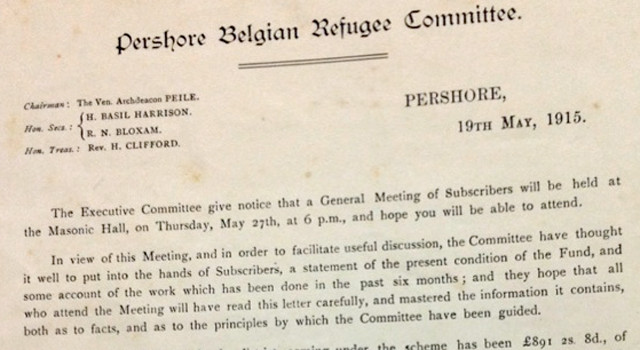Articles

No Comments
By Voices
On 28, Oct 2015 | No Comments | In Cities | By Voices
Belgium Refugees in Pershore and Evesham
Emily Linney, University of Worcester
Between the months of September and December 1914, 250,000 Belgium refugees entered Britain fleeing the German invasion of their homeland; this was the largest flood of people into Britain to date.
Initially arriving in Folkestone, Kent, the refugees soon moved to be accommodated in towns and villages across the country. These smaller towns and villages included Pershore, Evehsam and surrounding villages, such as Eckington, Fladbury, Elmley Castle, Great Comberton and Defford.
The residents of Pershore and Evesham responded to the news that refugees would be brought to their area in a number of ways. Donations of money, furniture, and even houses were made to accommodate refugee families and a committee was set up to co-ordinate the support and billeting. The grand sum of 33 shillings was successfully raised at a mixed cricket match in Evesham during September 1914; when it was decided that the money taken during the tea break would be donated to the relief fund for the Belgians; various ladies of the town supplied refreshments. Elsewhere in the nearby town of Chipping Campden, a concert was held in aid of Belgium refugees on September 19th 1914, resulting in over £52 being collected for their ‘maintenance’ in the local area.
![Pershore Belgium Refugee Committee, 1915 [Courtesy of Worcestershire Archives and Archaeological Service]](http://www.voicesofwarandpeace.org/wp-content/uploads/2015/10/belgian-refugee-comm-p.jpg) In Spring 1915, the Chairman of the Belgian Refugee Committee recorded the sums collected to provide aid totalled £891 2s 8d over six months. £676 15s 3d was accumulated by the many local villages who agreed to pay weekly subscriptions to financially support the 45 refugees under the care of the committee. School log books recorded that local school children were also helping ‘needy Belgium refugees’; following a talk on the plight of the Belgians, St Mary’s C of E School in Hanley Castle knitted blankets and held a school fete which raised £1. 15. 10. for the Belgium Relief Fund.
In Spring 1915, the Chairman of the Belgian Refugee Committee recorded the sums collected to provide aid totalled £891 2s 8d over six months. £676 15s 3d was accumulated by the many local villages who agreed to pay weekly subscriptions to financially support the 45 refugees under the care of the committee. School log books recorded that local school children were also helping ‘needy Belgium refugees’; following a talk on the plight of the Belgians, St Mary’s C of E School in Hanley Castle knitted blankets and held a school fete which raised £1. 15. 10. for the Belgium Relief Fund.
Some support for the refugees in the areas came from further afield. In November 1914 a significant donation of supplies came from Mrs Barrow Cadbury of Edgbaston, Birmingham, after Mr. E. Ward, a commercial traveller for the firm of Cadbury Brothers, had learnt what Pershore was doing for the refugees and appealed to her for further help. She gifted 50 bedsteads, 50 beds, 50 blankets, and 50 pillows to refugees located in Pershore, who had arrived the previous month. The gift was estimated to have cost a very generous £40 due to the newness of the items. Mrs Cadbury was a trustee of the Cadbury Institute which had been helping refugees until more permanent places were found for them.
There were attempts to provide a degree of normality for the Belgium refugees. This is shown in the Evesham Journal’s report on the decision to allocate work to refugees, with men being offered a minimum of 15 shillings and women 9 shillings a week wages. The Pershore Almanac recorded on November 4th 1914, that of the 45 refugees under the Pershore Committee, all males were working and their work on the land and was expected to help reduce the shortage of labour needed for harvesting in the future. However when in October 1914, with ‘good intentions’, two refugees were treated to beer from a local public house, one refugee reportedly became troublesome. They were described as being unused to drinking alcohol and were overcome by the quantities that they drank. Whilst this case suggests that local people were attempting to welcome the refugees, there was subsequently a warning issued in the newspaper advising against ‘the public treating refugees with strong drink’.
There are some indications that perhaps the initial hospitality and enthusiasm towards refugees began to wane a little over time. This is alluded to in the Chairman of the Pershore Relief Committee’s report on May 19th 1915 in which he appealed for subscriber’s ‘continued and renewed support’. After six months, they had become concerned about how much longer the Belgians would need their help. However, the efforts of the Great British people did not go unrecognised by Belgium, who expressed their ‘eternal gratitude’ for help in their ‘hour of need’ both to the people on the home front looking after refugees, and also to the British soldiers who were sent to aid in the ‘fight for civilisation’.



Submit a Comment